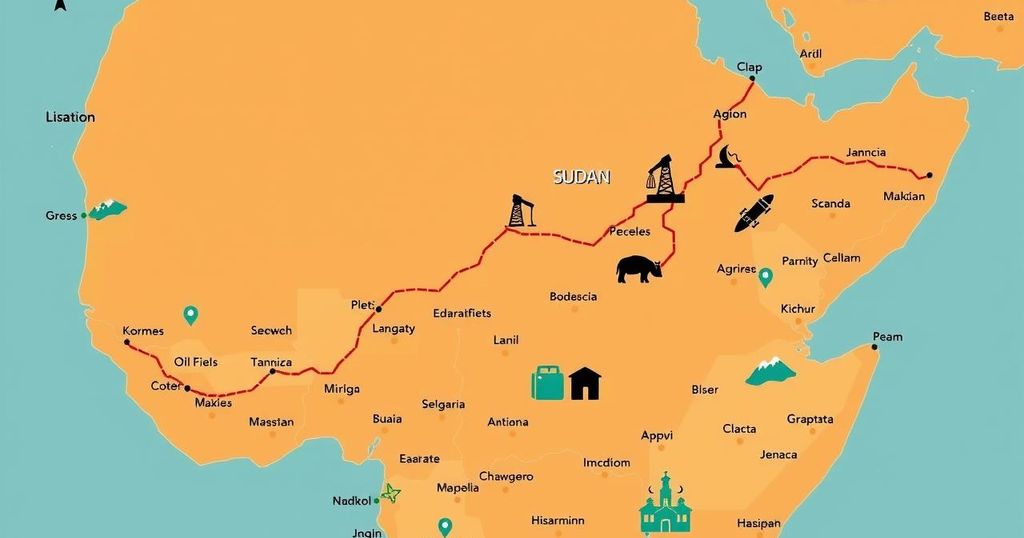Middle Eastern Monarchies’ Interests in Sudan’s Civil War: An Analysis
The civil war in Sudan starting in April 2023 has involved multiple external actors, notably Saudi Arabia and the UAE, which provide alleged support to local factions amidst a humanitarian crisis. The monarchies’ interests are shaped by historical ties and geopolitical strategies, particularly following the 2011 Arab uprisings. The ongoing conflict highlights the complexities of Sudan’s internal divisions and the broader implications for regional stability.
The ongoing civil war in Sudan, instigated in April 2023, has seen external actors, including Chad, Egypt, Iran, Libya, Qatar, Russia, Saudi Arabia, and the United Arab Emirates (UAE), taking sides. The warring factions include the Sudanese Armed Forces and the paramilitary Rapid Support Forces, with the resulting conflict contributing to a severe humanitarian crisis. Notably, Saudi Arabia and the UAE allegedly provide military and financial backing to these factions, despite publicly rejecting such claims.
The factors instigating the civil war are primarily domestic, but external influences, particularly from Gulf states, have played a significant role. Saudi Arabia and the UAE have had extensive interactions with Sudan over the past two decades. Saudi Arabia’s ties to Sudan date back to its independence in 1956, characterized by a long history of strong personal and political connections, largely due to geographical proximity to the Muslim holy cities. Conversely, the UAE has enhanced its regional influence in Africa since the early 2000s, concentrating on sectors like port logistics.
Significant relationships between the two Gulf monarchies and Sudan developed under President Omar al-Bashir between 2014 and 2015, as both nations aimed to limit Iranian influence in the region. Saudi Arabia’s collaboration with Sudan included military support in the Saudi-led campaign against Houthi rebels in Yemen. Following al-Bashir’s ousting in 2019, Saudi and UAE influence has persisted, manifesting through their allegiances to pivotal figures within Sudan’s political landscape.
The competitive nature of the Gulf monarchies has become apparent following the transition period post-2019. Saudi Arabia promotes strong ties with Sudanese army leader Abdel Fattah al-Burhan, while the UAE aligns itself with Rapid Support Forces leader Mohamed Dagalo, creating further competition that complicates Sudan’s internal dynamics. Despite their historical cooperation, divergences in their political strategies regarding Sudan have become increasingly pronounced, particularly in the context of political Islam.
Sudan’s geopolitical significance is underscored by its strategic location in the Horn of Africa and its role as a connection between the Mediterranean and sub-Saharan Africa. This positioning makes it vital amidst ongoing regional instability marked by political turbulence and conflicts. Furthermore, the UAE and Saudi Arabia have heavily invested in Sudan’s agricultural sector, viewing it as crucial to their food security needs.
The resolution of the Sudanese conflict appears increasingly distant, complicated by both factions’ determination to prevail over the other and the international landscape that inadvertently encourages ongoing hostilities. With two emerging centers of power, the schism within Sudan is likely to deepen, presenting ongoing challenges for any potential negotiations towards peace.
The civil war in Sudan involving external actors such as Saudi Arabia and the UAE underscores the complex interplay of domestic and regional factors contributing to the conflict. These monarchies have significant historical and strategic interests in Sudan, which are driven by concerns over regional stability and economic opportunities. As the hostilities continue, the emergence of two competing power centers within Sudan complicates the prospect for a peaceful resolution.
Original Source: theconversation.com




Post Comment